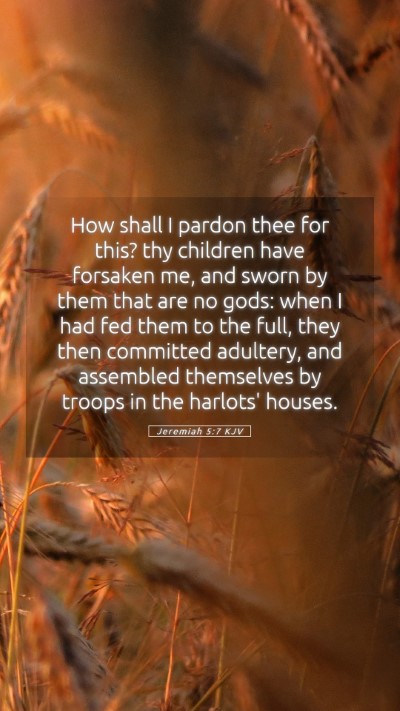Understanding Jeremiah 5:7
Jeremiah 5:7 states: "How shall I pardon thee for this? Thy children have forsaken me, and sworn by them that are no gods: when I had fed them to the full, they then committed adultery, and assembled themselves by troops in the harlots' houses."
This verse speaks volumes about the spiritual state of Israel at the time of Jeremiah's prophecy. It addresses themes of idolatry, unfaithfulness, and the consequences of abandoning the true God for false idols.
Bible Verse Meanings
The meaning of Jeremiah 5:7 can be unpacked through several key components:
-
Divine Justice: The verse speaks to the justice of God. Jeremiah questions how God can overlook such blatant unfaithfulness, highlighting the seriousness of sin against God.
-
Idolatry: The children of Israel have turned to false gods, which demonstrates a profound breach of their covenant relationship with the Lord. This reflects a broader theme in scripture where worship of idols leads to spiritual and societal decay.
-
Consequences of Abandonment: The mention of God feeding them reflects His provision, yet despite this care, they choose to reject Him. This contrast emphasizes the depths of their betrayal.
-
Symbolism of Adultery: Spiritual infidelity is likened to adultery, a powerful metaphor that illustrates how seriously God views His covenant with His people. The act of assembling in ‘harlots' houses’ indicates a deliberate choice to engage with sin.
Bible Verse Interpretations
Several public domain commentaries provide additional insights into this verse:
-
Matthew Henry: He emphasizes the gravity of forsaking the God who sustains and provides. Henry discusses how the prosperity enjoyed by the Israelites led to their complacency and subsequent unfaithfulness.
-
Albert Barnes: Barnes points to the historical context of the nation’s moral degradation, linking the forsaking of God to a broader cultural trend towards idolatry. He notes that their rebellion was not just against God's commandments but also against the very nature of God’s goodness toward them.
-
Adam Clarke: Clarke elaborates on the metaphor of adultery, linking it to the covenantal relationship God had with Israel. He asserts that the hardness of their hearts made them impervious to God’s warnings and chastisements.
Bible Verse Explanation
The verse is a profound statement about the relationship between God and His people. It raises several fundamental questions about faithfulness, accountability, and the nature of divine grace:
-
What does God expect from His followers? This passage illustrates the expectation of loyalty to God. The inquiry of how God can pardon such actions shows divine disappointment and the seriousness of spiritual unfaithfulness.
-
What are the consequences of forsaking God? The consequences are dire, as provided for in the narrative of Israel’s historical responses. This encourages readers to consider their own lives and the seriousness of sin.
In-Depth Bible Verse Analysis
An in-depth analysis should consider the historical context, particularly the conditions leading up to the Babylonian exile. Israel's disobedience, rebellion, and idolatry starkly contrast with God's mercy and provisions.
Understanding this passage requires studying not only Jeremiah but also cross-referencing other prophetic books that address similar issues of idolatry, unfaithfulness, and divine judgment.
Cross References
This verse can be related to:
- Hosea 1:2 - The metaphor of marital unfaithfulness.
- Ezekiel 16 - The portrayal of Israel’s unfaithfulness.
- Isaiah 1:4 - The charge of rebellion against God.
Applying Bible Verses to Daily Life
In applying Jeremiah 5:7 to our lives, believers are called to examine their own faithfulness to God. It prompts reflection on the idols that may creep into their lives and how they relate to God’s provision and care.
Conclusion
Jeremiah 5:7 serves as a timely reminder of the need for faithfulness to God amidst the distractions and allurements of the world. As we engage in Bible study groups or utilize Bible study tools, this verse can catalyze discussions on accountability, love, and the importance of a vibrant relationship with God.


